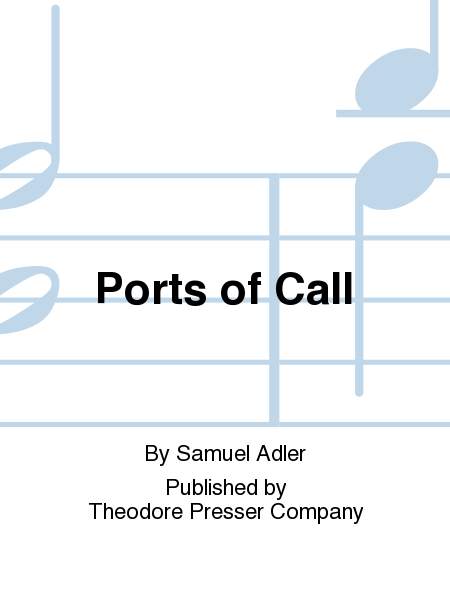Ports of Call$55.00 - See more - Buy online Lead time before shipment : 2 to 3 weeks Chamber Music Guitar, Violin 1, Violin 2 SKU: PR.114407260 A Mediterranean Suite. Composed by Samuel Adler. Set of Score and Parts. With Standard notation. 24+16+16+12 pages. Duration 14 minutes. Theodore Presser Company #114-40726. Published by Theodore Presser Company (PR.114407260).UPC: 680160011209. Ports of Call, a suite of five movements for two violins and guitar was written for the Trio Triento for their New York debut. Composed in the Summer of 1992, it was premiered in April 1993. 1992 was the 500th anniversary of the 1492 expulsion of the Jews from Spain and, of course, Columbus' trip to America. To commemorate these important events, I was commissioned by organizations in 20 major cities to write an oratorio. The result was Ever Since Babylon. The musical material was greatly influenced by tunes from around the Mediterranean region. These Sephardic melodies took on treat meaning for me, and I took five of them and expanded them into these five pieces which are actually dances. I felt that the combination of two violins and guitar lent itself well as a vehicle for this music. The names of the cities are used because the tunes originated in these particular locations. Marseille, a typical provencale dance with naturally changing meters and a light, airy, touch. Alexandria, much more mysterious and languid, reflecting the heat and inertia of that glorious city in slow though sometimes steady movement. Salonika, a wild dance in typical Greek fashion celebrating a holiday with abandon. The whirling movement goes relentlessly from beginning to end. Haifa is represented by two beautiful chant-like pastoral tunes which introduce the beauty and luminous quality of this, one of the most beautiful parts in the Eastern Mediterranean. Valencia, the last, a tribute to medieval Spain. The music is a culmination of the influences of the three great cultures, Moslem, Christian, and Jewish, which flourished there for hundreds of years. It is an uplifting dance with just a tinge of sadness in the center, since the Golden Age of which the tune was a part, had come to a tragic end in 1492. --Samuel Adler. Publisher : Theodore Presser Co.
|







